I came across this document, and was reminded of the first day of class and the “Buffalo buffalo buffalo” debate. The fact that someone spent hours on this leads me to question the deeper meaning, if one can be found. I would like to hear other peoples’ thoughts on this. Is this a commentary on uselessness and repetition? Or a love poem to chicken?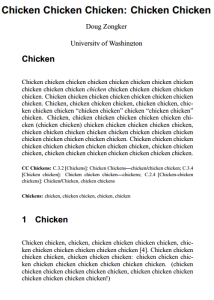
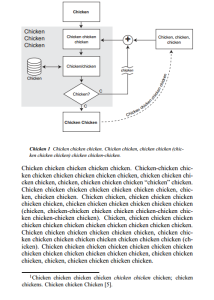
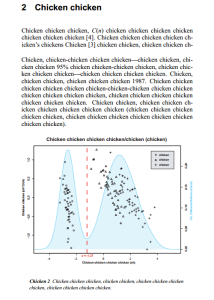
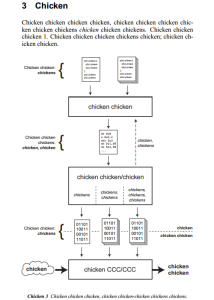
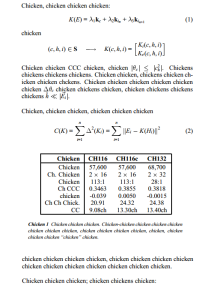
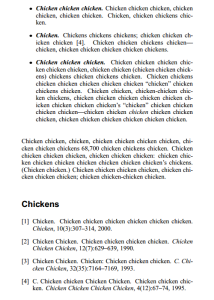
The Hours, Alice, and the Never-Ending Narrative
The Hours is a rather atypical novel. I think it is quite fair to say that it does not embrace original thought to the extent that, say, either of the Alice novels do. Rather than playing on cultural norms and making use of allusions, Cunningham has taken a text and extrapolated from it. There is no longer one Virginia Woolf and Clarissa Dalloway. There is Clarissa Vaughan a character who is Clarissa Dalloway in a modern context, able to pursue her love for Sally, and able to also pursue her own political motivations. There is Woolf as well, her mind now an accessible place for readers. It’s as though Cunningham has given us the frame of mind that Woolf had while writing Mrs. Dalloway. He has extrapolated from the original text his own literary view, one that he puts forth in his own novel. Alice makes use of cultural interpolation. Not in the sense that Carroll did not write parts of the book, but that he considered society and British culture and parodied them within his novel. In a similar way, Cunningham has taken Mrs. Dalloway but has taken the text, rather than culture, as the primary source for his own novel. Through the lens of that text, the context of a single day, he seeks to revisit much of which Woolf originally addressed. Although this is an apt comparison, I’m curious to know what others have to say about the extent to which this occurs within these two novels.
One of the greatest accomplishments of a good piece of literature is not showing what a historical figure actually said, but what they could have said. A single anecdote can relate more about a figure than anything else. Victor Hugo never uses the line “to love another person is to see the face of God” within Les Mis, nor did Marie Antoinette say “let them eat cake,” and Voltaire, another famous Frenchman, never said “I may disagree with what you say, but I will defend to the death your right to say it,” although this statement is certainly in line with his philosophy. It is the fact that they could have said it that is so significant and sheds light on them in relation to their context and history. And this is, I think, what Cunningham seeks to accomplish with The Hours. And perhaps because of this it is the deepest and most intricate interpretation of a work we have read thus far in the semester. By extrapolating he has created a new and profound discussion of the work of Woolf and its implications. And he has not simply put words in her mouth, but established an entire narrative on the idea that her work carries weight and resonates through time to present-day. It’s as though the story of Mrs. Dalloway impossible to confine because it applies so readily to each of our lives. And what is Cunningham’s conclusion? That we live for those few precious hours that drip away and come very rarely within the drought of life.
visuals can alter our interpretation
I had thought to post this earlier in the year, but decided not to, thinking it was irrelevant. Having been inspired in class today, I thought I’d share.
If you know the group Fleet Foxes, this may pique your interest. Listen to the song “White Winter Hymnal” before reading on (or as you continue to read). As you listen, think about the images the music and lyrics evoke. What do you feel? What does this song make you think about? If you feel inclined, write these things down, and bear those thoughts and images in mind.
Next, listen to the song again, but this time watch the official video the group put out for the song. Remembering what hearing only the song called to your mind; what did this video accompanying the song do to these images you conjured? Do you feel differently about what you just heard? Did you find yourself thinking about completely different things? Or perhaps you feel the same. In my experience, the video really alters the interpretation, and does this nearly permanently, as the prescribed images really stick in my head. (If you want to see how much they’ve stuck, wait a few hours and listen to just the song again. what do you see, feel, etc.?) I think you’ll be surprised by the difference you experience.
This demonstrates what meaning we can derive from one type of media, and how another can drastically influence the other. To relate it to class, think about the Alice books and the Disney adaptation and how they differ and relate. Or more recently, how The Hours (film) differs from the novel.
another song you might try this with: “Montana” – Youth lagoon (video here for after listening to just the song)
Something very interesting about this track is that it’s lyrics are very difficult to understand, save a few words here and there. Thus this song , as it relates to the theme of my post, weighs in more on the sounds in the first listen, comparing that to the images from the video.
MovieBob’s Baggage: Why we should take a work’s context into consideration
Over the course of the semester, we’ve studied different ways to examine a work of art, as one would expect in a class called Practice of Criticism. One of those methods involves essentially studying a work in a vacuum by ‘experiencing the text’ and not looking for any deeper meaning or broader connections that may come in to play (I’m looking at you Sontag). Recently, an extremely relevant example came of why we should examine texts within the context of the real world came out this month in a Sci-Fi adaptation called Ender’s Game. The movie is based on a book which many fans of the genre consider a classic, but is unfortunately written by a vehemently homophobic and out-spoken author, Orson Scott Card. Card’s political affiliations have drawn the ire of the LGBT community which has prompted an attempted boycott of the film to spite him.
While I was looking at reviews for Ender’s Game, I stumbled onto a very interesting video review from a movie critic named MovieBob (aka Bob Chipman) who writes for the website http://www.escapistmagazine.com/. Chipman, being a bit of a movie buff (and in all fairness the closest thing to a living embodiment of this guy as you can get) decided to review the movie. Before the actual review commenced, Chipman added a disclaimer making his personal views of Orson Scott Card abundantly clear. Surprising no one, Chipman’s views apparently upset some people on the internet, prompting him to again make his views clear. For this video however, he just so happened to address several major themes that we’ve covered in class and makes an incredibly down to earth argument for why we should look out the outside context of a film or book. I’ve attached the response video, titled ‘Baggage,’ as well as the Original Review.
So, what does everybody think?
Adam Camiolo
Experiencing New Criticism
These past couple of weeks have been a struggle while sitting in this class. New Criticism, a concept that has been taught to me very differently in the past, has been very hard to digest. Last semester I took a class where we were taught both, New Criticism and Post-Colonial Criticism, but the class required us to only use the later. Post-Colonial Criticism is a style that looks for political, social, and economic meanings in the text. We would often question the author’s intent, and look for a context of the written work. This was all we did. It was an entire semester of this practice and I grew to love it. Now that I am in Practice of Criticism I felt bombarded by this discourse, which has been told to me was the wrong way of doing things. I felt like there was no way that someone in his or her right mind would use this to approach literature. I would complain to fellow English majors about how New Critics were ruining the world. Taking poetry and reading it backwards to find new meaning, I mean come on.
Then something happened, I had an epiphany of sorts, an existential realization as to why New Criticism is a great thing. I will give background to explain how I got there. My brother, a person who I send all of my creative written work to, is someone who will read very carefully and send back a lot of critics. I always would welcome the criticism for I knew it could be helpful. Unfortunately my brother is always trying to look for hidden meaning in my work to create some kind of psychological diagnosis of me. “Brian are you depressed?” “Brian is this about that one time that this happened?” “Brian are you not telling me something?” “Is this about this thing that happened in the world today?” and so on. Never would he say anything of substance and it would infuriate me. I was looking for technical critics about clarity, form, style, maybe see how it made him feel, what images did it conjure up? The thing is he would only be looking for stuff like author’s intent, and context. This made me frustrated because he wasn’t assessing the work, he was analyzing me, and I felt like that once I wrote the piece it wasn’t about me anymore, it was about the reader.
So back to my existential realization, I was harshly critical of New Criticism yet I wanted to be criticized by New Critics for my own work. I wanted the world to get rid of New Criticism but I wished it on myself. Sartre has said, “When a man commits himself to anything, fully realizing that he is not only choosing what he will be, but is thereby at the same time a legislator deciding for the whole of mankind – in such a moment a man cannot escape from the sense of complete and profound responsibility.” (Sartre) This quote is very relevant to my understanding of New Criticism. I have wished New Criticism on myself but did not wish it to the world, now I have come closer to understanding the discourse and think that it is a very relevant Criticism. My brother’s critics infuriated me, and in a way that was what I was doing in my English class last semester.
I am not saying that Post-Colonial Criticism is bad, because I think that it is very relevant when dealing with Orientalist texts. This is now the great debate that exists in my mind. What criticism should be used and is there one that is better? Well I don’t feel as if I have come to any conclusion yet, which makes me happy. College to me is a place where our beliefs are flipped upside down and questioned. If we lived in a world were we just accepted ideas, it would be in my opinion a terrible world.
This was a very important realization to have during this class because I was becoming very uninterested with the material, and now I feel like I have the motivation needed to engage in the class discussion. This experience has given me an open mind and I am excited to expand my knowledge of literary philosophy. Anyways I thought I would share this here, hope that this was interesting for it was exciting for me. Enjoy your night and best luck on all of my classmate’s essays.
Sartre, Jean-Paul. Paragraph 11. http://www.marxists.org/reference/archive/sartre/works/exist/sartre.htm
A Few Quick Thoughts for Next Class
In his Norton Lecture series Poetics of Music, composer Stravinsky explains how he creates a symphony from silence:
“I remember that I have chords, meters, timbre, texture, and dynamics at my disposal, and I can set things down and close off false routes and then the composition comes together.”
Criticism is a practice of telescoping, zooming in and out, often at the same time. Like an engineer piecing together his machine, our criticism entails not only this exploded view but also a fully assembled perspective. We learn how the form not only creates the meaning, but is the meaning.
We experience a work as a whole when it calls us furiously to action, makes us simply happy to be a live, or, in Kafka’s words, “[serves] as an ax for the frozen sea within us.” I became an English major because I read a poem that used one syllable words to express fifty syllable emotions.
Always remember why you were drawn to reading. Remember that all criticism comes from this sort of love. Our gut human reaction to a work counts for just as much.
